Sexual harassment: Women share experiences on Transport for London network as problem soars across Britain
and live on Freeview channel 276
Nearly 200 women have shared hard-hitting personal accounts of being sexually harassed on public transport in London, calling on Mayor Sadiq Khan to do more to tackle the issue.
It comes in the wake of figures which show that reports of sexual offences on Britain’s travel services have more than doubled since before the pandemic.
Advertisement
Hide AdAdvertisement
Hide AdActivist Zan Moon collected a range of testimonies, some from victims as young as 11, which detail women’s experiences of being sexually harassed on Transport for London (TfL)’s buses and trains.
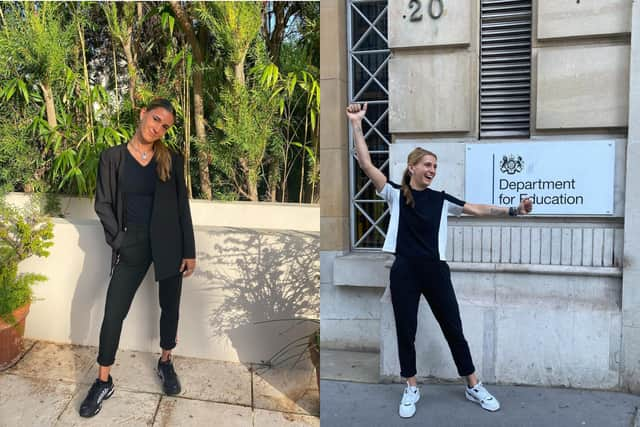

The 25-year old charity worker collated the stories in an open letter to Sadiq Khan, in which she calls upon the Mayor of London to introduce practical changes to prevent inappropriate sexual behaviour on the capital’s travel network.
Although the campaign - published on Instagram - focuses on London, the stories documented represent the experiences of many women across the UK.
Mr Khan’s office said he was working with police to “stamp this predatory behaviour out”.
What the open letter says
Advertisement
Hide AdAdvertisement
Hide AdMs Moon refers to London’s travel network as “the ultimate hotbed of harassment,” writing that women are unable to travel home “without being catcalled, groped, upskirted, stalked, insulted, assaulted or even murdered”.
She continues: “Safety is a basic human right. Yet women are being denied this right time and time again.”
In the letter, Ms Moon compiled 180 testimonies which she split into the categories ‘exposing/self-gratification’, ‘verbal harassment’, ‘non-consensual touching and pressing’, ‘stalking’, ‘upskirting and filming’, and ‘staring’.
The campaigner decided to write the letter after her own experience of sexual harassment on the tube.
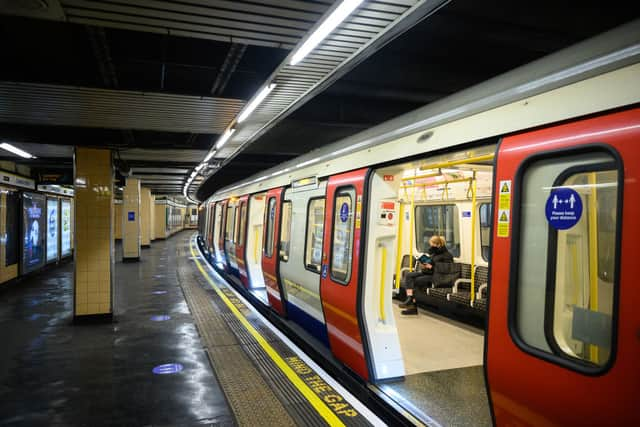

Advertisement
Hide AdAdvertisement
Hide AdShe told NationalWorld how a man approached her and her girlfriend and directed a range of distressing statements at her, including homophobic slurs, demands they “have sex in front of him”, and frightening, sexually explicit language.
But when Ms Moon reported the incident to the British Transport Police (BTP), she was told nothing could be done as CCTV on the network is deleted after 72 hours.
“We have a new pandemic on our hands - violence against women,” Ms Moon told NationalWorld.
“It’s always been in existence of course, but it’s particularly bad at the moment because it’s just not being prioritised.
Advertisement
Hide AdAdvertisement
Hide Ad“Sadiq Khan is saying he’s doing XYZ, but it’s clearly not the case. This needs to be a priority. Something needs to change.”
Ms Moon clarified that while it “is of course a national issue”, London’s extensive travel network and the fact that people often “travel drunk” makes TfL’s services a target for offenders.
‘We have a new pandemic on our hands’
She added: “We’ve also had a series of strikes recently, which means every drunk man in London piles onto one train. That’s when my experience happened.”
Ms Moon, who hosts Instagram account @screengrabthem which is dedicated to exposing online harassment with screenshot evidence, argued that systemic change is needed in order to tackle sexual harassment.
Advertisement
Hide AdAdvertisement
Hide Ad“The root cause of this behaviour is a lack of education from a young age about misogyny and feminism,” she said.
“Boys aren’t taught about boundaries and consent, and they’re not taught about misogynistic and harmful language.”
Ms Moon previously wrote an open letter to multiple private schools and universities asking for a change in the education system after compiling testimonies from girls who experienced sexual harassment at the hands of male students.
She was subsequently invited to meet with the Department of Education to discuss her ideas for change.
Advertisement
Hide AdAdvertisement
Hide Ad“It’s not a priority in the school curriculum,” Ms Moon said. “It was only made part of PSHE guidelines for secondary schools in 2020 so there’s a whole generation of people who weren’t taught about these things from a young age.”
However, she said that in the meantime practical changes need to be made to keep women safe, which is why she ended the letter with a list of suggested actions for the Mayor of London. These include:
- To add CCTV to the Bakerloo and Central lines, and do not delete footage after 72 hours;
- To install WiFi or phone signal on the underground service, so that women can contact police for help;
- To install ‘harassment panic buttons’ on public transport which alert police to board the tube carriage or bus at the next station;
- To increase police presence on public transport - particularly female police
Ms Moon said: “I say female police because they will have a lived experience of these incidents so may be more likely to pick up on nuanced situations, whereas a male officer may not notice.
“But in general, we need more police officers. Where are they? They’re not on tubes or buses, that’s for sure, which is where harassment and assault is happening.”
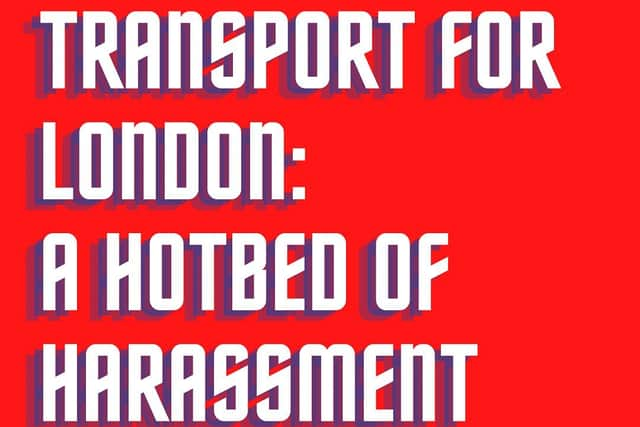

Advertisement
Hide AdAdvertisement
Hide AdDiscussing her request for WiFi or network coverage, Ms Moon said: “There are all these posters on the tubes which say ‘text this number if you need help’, but the London Underground is the one place in the city where there is no service.
“It’s ridiculous. It’s just box-ticking.”
What the Mayor of London said
Since NationalWorld spoke to Ms Moon, the Mayor of London’s team has contacted the activist to discuss her open letter.
A spokesperson for Sadiq Khan told NationalWorld: “Violence against women is an epidemic across our country.
“The Mayor is clear that it’s completely unacceptable that women and girls face this vile, criminal behaviour when they are going about their day on public transport in our city.
Advertisement
Hide AdAdvertisement
Hide Ad“[Mr Khan] is working with TfL and the police to take a zero-tolerance approach to all forms of sexual harassment across the whole network, and stamp this predatory behaviour out.”


The spokesperson continued: “[He] is clear that violence and harassment towards women is a deep cultural problem in our society, and we must not simply respond to male violence against women and girls, but prevent it - which is why he continues to take action by funding initiatives to address the behaviour of at-risk offenders to prevent incidents happening.
“A lot of work still needs to be done, but tackling violence against women and girls remains an absolute priority.
“The Mayor is determined to ensure that every woman and girl is safe, and feels safe – whatever the time of day and wherever they are in the capital.”
Advertisement
Hide AdAdvertisement
Hide AdIn the past, the Mayor has partnered with TfL to launch a poster campaign on the underground which calls out different forms of sexual harassment, such as cat-calling, upskirting and cyber-flashing.
He recently launched a joint campaign with TfL, BTP and National Rail called ‘Have A Word’ - which encourages men to speak up if they witness sexual harassment.
The spokesperson for the Mayor said during his time in office, he had overseen more than £100 million in investment in tackling violence against women and girls and continued to invest record amounts in services for victims and survivors.
Currently, sexual harassment training is being rolled out to all London Underground frontline staff.
What BTP said
Advertisement
Hide AdAdvertisement
Hide AdBTP said it believes the rise in sexual offences is down to people feeling more confident about reporting incidents to police.
A spokesperson told NationalWorld: “Although normally an increase in reported crime is seen as negative, we welcome the increased reporting of sexual offences.
“It tells us that more people are understanding that all types of sexual harassment are unacceptable, and having the confidence to tell us about what’s happened to them.
“Each report we receive provides us with valuable information which we can use to build a picture of an offender. Often it allows us to notice a pattern of offending behaviour and we will take action.
Advertisement
Hide AdAdvertisement
Hide Ad“No report is too small or trivial, and we will always take you seriously.”
In the financial year ending March 2020 there were 361 reports of sexual harassment and sexual offences on transport services, BTP figures show.
In the financial year ending March 2022, this rose to 995 reports - a 175% increase.
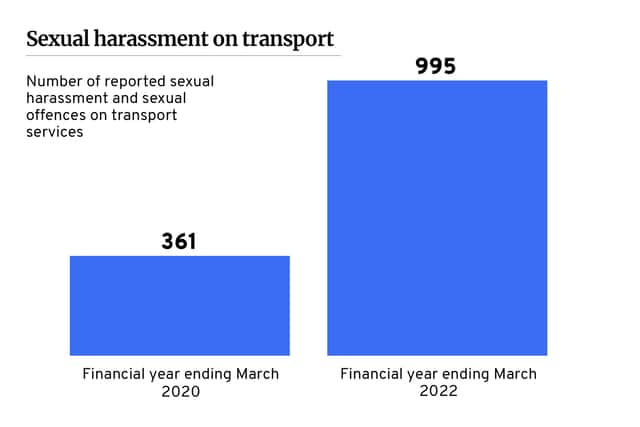

BTP encouraged anyone who experiences or witnesses sexual harassment on transport services to text 61016 or use the new Railway Guardian app which was launched as part of BTP’s ‘speak up, interrupt’ campaign.
Advertisement
Hide AdAdvertisement
Hide AdThe force’s sexual offences lead, Detective Superintendent Sarah White, said: “We must shift the focus away from just relying on victims to report sexual harassment to us, because everyone has a part to play in driving out this unacceptable behaviour.
“We’re not asking people to police the railway, that’s our job. But small actions such as offering someone your seat if you notice them looking uncomfortable, alerting an officer, or reporting an incident to us can make an enormous difference.”
In February, Metro reported that less than 15% of all crimes reported to BTP last year resulted in successful prosecution.
What TfL said
Siwan Hayward, TfL’s director of compliance, policing, operations and security, said: “We operate a zero-tolerance approach to all forms of unwanted sexual behaviour and sexual harassment on London’s public transport network and are committed to ensuring that women and girls feel safe while travelling.
Advertisement
Hide AdAdvertisement
Hide Ad“We have a bold and clear sexual harassment campaign on our network which names the behaviours we will not tolerate.”
Ms Hayward added that TfL works with police to pursue all sexual harassment offences, using the service’s “extensive network of CCTV.”
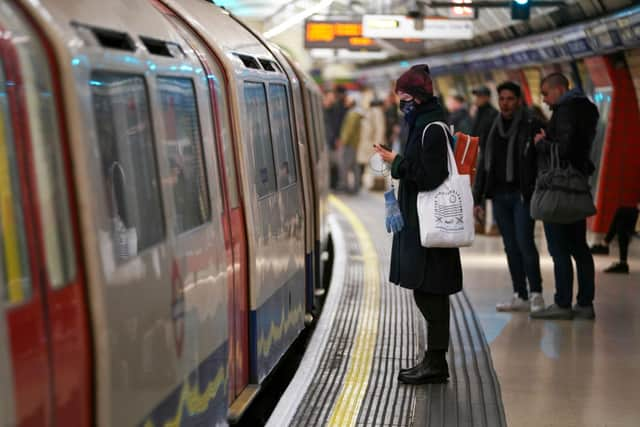

She said more than 2,500 police and police community support officers, as well as 500 TfL encorcement officers, patrol the network in order to keep passengers safe.
“The safety of women and girls is an absolute priority for us,” Ms Hayward continued, “[and] tackling sexual harassment is an essential part of this.
Advertisement
Hide AdAdvertisement
Hide Ad“We continue to invest in transport policing to prevent and tackle sexual harassment across our networks. We ask those that experience or witness sexual harassment to report it so we can work to prevent it and to take action against perpetrators.”
What other campaigns are there?
Plan International UK and OurStreetsNow partnered in recent years to launch their #CrimeNotCompliment campaign which asks the Government to introduce legislative change to make public sexual harassment a criminal offence.
Katie Morrison, Director of Campaigns and UK Programmes at Plan International UK, told NationalWorld: “Girls and young women across the UK are facing harassment every day.
“They’re being followed, shouted at, touched and groped – and they want it to stop. This relentless harassment is affecting their mental health and causing them to avoid exercising, travelling on public transport, and sometimes even going to school.”
Advertisement
Hide AdAdvertisement
Hide AdShe said there is currently no UK law that fully criminalises public sexual harassment, which “means that many harmful behaviours are falling through the legal cracks, leaving girls and young women unprotected.”
Ms Morrison continued: “As one girl told us, you can be fined for dropping litter in the UK, but not for harassing a woman or girl in public. This cannot be right.
“Our #CrimeNotCompliment campaign seeks to change this.”
At the time of publishing, the campaign has 62,151 signatures.
In Newcastle, The Tyne and Wear Metro has secured Safer Streets funding from the Government.
You can read about their initiative on our sister site, NewcastleWorld.
